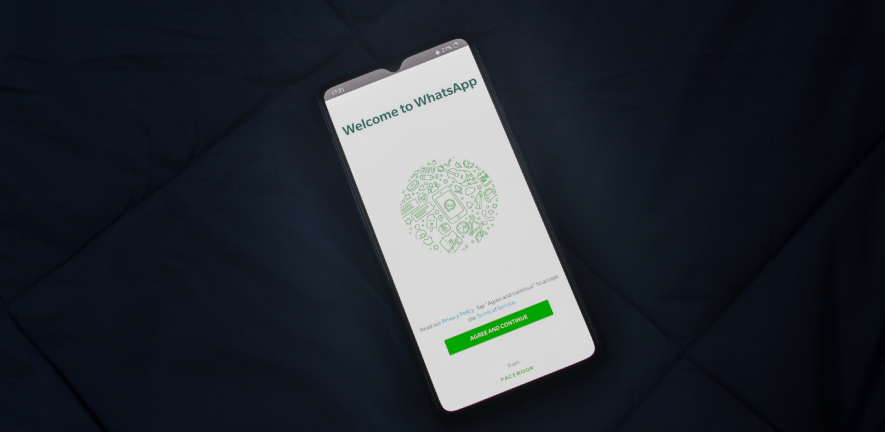WhatsApp Must Treat Indians on Par With Global Users: Union Government Before the Supreme Court

Representational Image.
The Constitution bench decided to give the Union Government three and a half months to put a legislation in place to deal with the privacy issues, before it hears challeges to WhatsApp’s privacy policy.
– – –
A Constitution bench of the Supreme Court has, on Thursday, listed for final disposal petitions filed last year challenging WhatsApp’s 2021 privacy policy. The bench comprised Justices K.M. Joseph, Ajay Rastogi, Anirudha Bose, Hrishikesh Roy, and C.T. Ravikumar.
Last year, WhatsApp had updated its privacy policy, as per which WhatsApp could share with social media platform Facebook the metadata of users and their messages with business accounts (both Facebook and Whatsapp are owned by American multinational technology company Meta Platforms). WhatsApp’s privacy policy only applied to India, because India does not have a robust data protection regime. The policy had attracted criticism due to concerns over the violation of privacy of users.
Senior advocate Shyam Divan, for the petitioner, began by providing context on the privacy policy, and how challenges to it landed up at the Supreme Court. He contended that WhatsApp has distinct privacy policies for India and Europe, due to which Europeans enjoy a higher order of privacy using the app in relation to Indians. He argued that “Indian users ought not to be disadvantaged qua users in the global jurisdiction” because of privacy’s status as a fundamental right, as well as its recognition as a global human right. Further, he stated that in the absence of local laws, corporations must adopt golden standards.
He also pointed out that a previous Constitution bench of the court had already heard the petitions on maintainability.
Solicitor General of India, Tushar Mehta provided the Union Government’s stand, that Indian users of WhatsApp cannot be discriminated against other users of the app. He averred that the government is cognizant of the situation, and working on a personal data protection bill to address it. He therefore requested the court to keep the matter on hold till the Bill is in place. To this, the bench quipped that if the government was keen on having a legislation, it could have put it in place.
Senior advocate Kapil Sibal, representing WhatsApp, commenced by stating that while WhatsApp’s privacy policy is different for Europe, for all other jurisdictions, including India, it follows the policy under challenge.
The bench stated at this point that since India has the highest number of WhatsApp users among all countries in the world, the advantages and disadvantages qua this largest group is the primary matter here. To this, Sibal responded that the issue is not whether Indian users are the largest group or not; it is on the law framed by the legislature in each country.
Mehta averred that WhatsApp must comply with the laws of India, and alleged that the company had violated Indian law on multiple occasions previously. He stated that WhatsApp must treat Indians equally with global users.
The bench contemplated whether to list the matter for January, to give the government ample time to put a data protection law in place so that the court doesn’t have to judicially interfere, or take it up at the earliest in November. It ultimately chose the former option, listing the matter for hearing for final disposal on January 17, 2023, and directing that pleadings in the matter be filed by December 15.
Litigation history
In March last year, the Competition Commission of India (‘CCI’) ordered a probe by its Director-General (‘DG’) into WhatsApp’s updated privacy policy, on the basis of its finding that WhatsApp had abused its dominant market position to coerce its 350 million users in India to accept its new policy with no scope of opting out.
It observed, “The conduct of WhatsApp in sharing of users’ personal data with other Facebook companies, in a manner that is neither fully transparent nor based on voluntary and specific user consent, appears prima facie unfair to users.” This order was challenged by Facebook and WhatsApp before the Delhi High Court, but a single-judge bench of the High Court dismissed their petition last month, paving the way for the CCI DG to probe the policy.
In May last year, WhatsApp filed an appeal against this order before a division bench of the High Court. The division bench of the high court had dismissed this appeal last month.
Also in May last year, the Union Ministry of Electronics and Information Technology had directed WhatsApp to withdraw its new privacy policy. In this communication, the Ministry stated that the changes to WhatsApp’s privacy policy and the manner of introducing the said changes undermine the sacrosanct values of informational privacy, data security and user choice and harm the rights and interests of Indian citizens. It reiterated that the policy violates several provisions of existing Indian laws and rules.
Get the latest reports & analysis with people's perspective on Protests, movements & deep analytical videos, discussions of the current affairs in your Telegram app. Subscribe to NewsClick's Telegram channel & get Real-Time updates on stories, as they get published on our website.
























